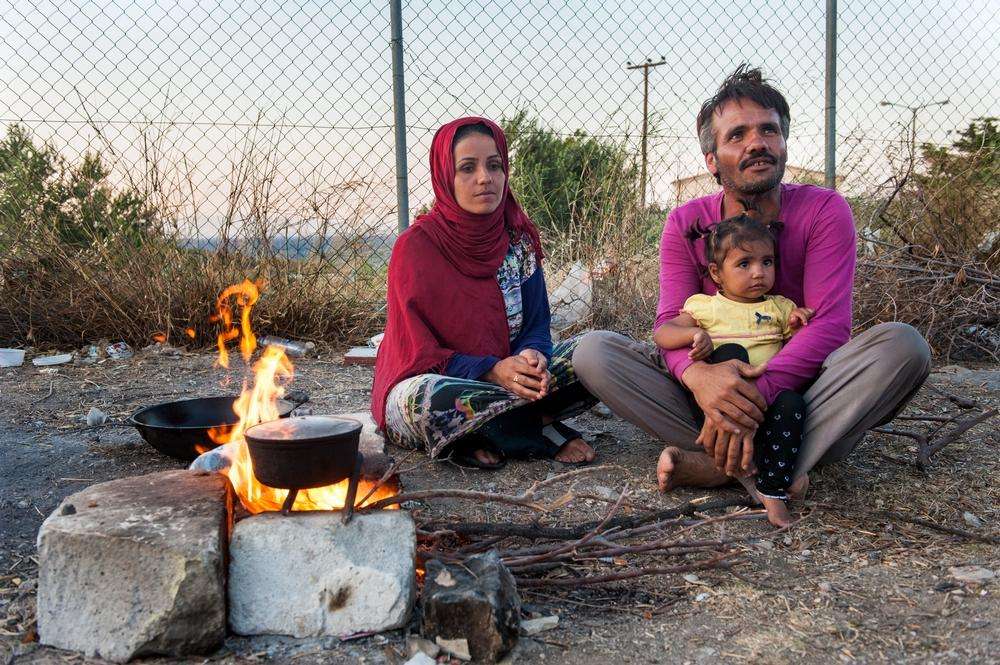BRUSSELS/ATHENS—The reception system in Greece's Dodecanese Islands is on the verge of collapse, with thousands of migrants and asylum seekers forced to camp outside or in abandoned buildings, and to endure a lack of water, shelter, latrines, and medical care, the international medical humanitarian organization Doctors Without Borders/Médecins Sans Frontières (MSF) warned today.
Approximately 5,000 people, primarily from Syria, Afghanistan, and Iraq, have arrived on the Greek island of Lesbos over the last few days, with most living in unmanaged camps lacking basic assistance. In Kos, 700 people are sleeping on the floor amidst rubble and shattered glass in an overcrowded, dilapidated building. MSF medical teams are treating conditions linked to unhygienic living conditions, including scabies and skin infections. MSF urged Greece, the European Union, and the United Nations High Commission for Refugees (UNHCR) to deliver humanitarian aid and improve conditions.
"The current situation is a violation of Greece's and the EU's obligations towards asylum seekers and migrants in Greece," said Stathis Kyroussis, MSF's head of mission in Greece. "Given the deep economic crisis that Greece is facing, it cannot be assumed that it can cope with this alone. The EU and its member states should urgently deploy humanitarian resources, including emergency funding and material assistance, to support Greece in responding to the basic needs of newly arrived migrants and asylum seekers. UNHCR also needs to take direct responsibility, translate their words into real action, and step up its response in delivering humanitarian assistance."
An MSF emergency response team has arrived in Lesbos, which is one of only two Dodecanese Islands with organized reception facilities. However, the existing Moria facility can only accommodate roughly 700 people, and it suffers from overcrowding, poor hygiene conditions and a lack of food. Most arrivals are staying on a plot of land called Kara Tepe that is not formally managed. Despite the authorities' efforts to distribute food, rations are insufficient.
"Leaving people to fend for themselves in a field full of garbage or in an abandoned building where there is hardly any water or latrines is simply unacceptable and is putting people's health at risk," said Elisabetta Faga, MSF emergency coordinator in Lesbos.
MSF plans to provide medical consultations, remove garbage, distribute relief items, and improve water and sanitation in the Kara Tepe and Moria camps. The organization is also providing bus transportation so that new arrivals do not need to walk the 70 kilometers (more than 40 miles) from arrival points on the north coast of Lesbos to the registration center in Mytilene.
While MSF and other organizations can assist in the humanitarian response, the efficiency and impact of relief efforts will be seriously hampered by the authorities' failure to provide and maintain an adequate reception system.
"Greek authorities should provide additional places under administrative responsibility of the state, where humanitarian assistance, such as food, shelter, sanitation, and medical care can also be provided by other organizations," Faga said. "Authorities also need to ensure that efficient registration procedures are put in place, and that new arrivals are provided with information about what to do and where to go."
Since March, MSF has provided medical care and distributed relief items to migrants arriving in the Dodecanese islands. Currently in Kos Island, MSF provides medical consultations and distributes relief items. Since mid-March, MSF has carried out 2,750 consultations and has distributed more than 20,000 non-food items such as soap, combs, toothbrushes, and towels. MSF has also started mobile clinics around the Dodecanese islands through a boat that visits smaller island locations where people arrive from Turkey. MSF has provided 256 consultations through this mobile boat clinic since activities began in June.
In Idomeni, close to the border with FYROM (Former Yugoslavian Republic of Macedonia), MSF is running mobile clinics and distributing relief items for those who first arrive in Greece and continue crossing the Balkans to go to northern Europe. Since April 1, MSF has provided consultations to 2,403 persons, and distributed relief items such as hygienic products, energy food, blankets and socks.





